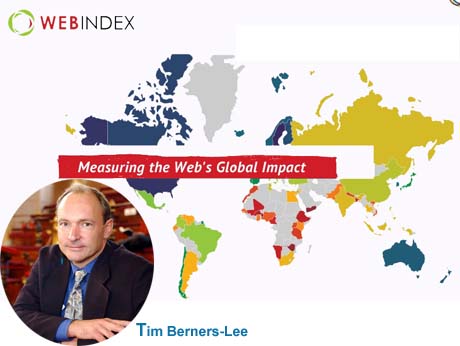
September 8 2012: The World Wide Web Foundation—an intiative of Tim Berners-Lee, the ‘father’ of Web -- has launched a Web Index – a new country-by-country global study that measures the impact of the Web on the world’s people and nations. India ranks 33rdout of 61 in the index. Sir Tim Berners-Lee said: ”The Web Index was created to measure the state of the Web in the world. Each country will see not only where they rank compared to others, but also what the World Wide Web Foundation thinks they need to do to improve.”
The highest ranking country in the Web Index is Sweden. The US ranks second, and the UK third. Yemen is the lowest ranking country in the Index, preceded by Zimbabwe.
Designed and produced by the World Wide Web Foundation, the Web Index is the world’s first multi-dimensional measure of the Web’s growth, utility and impact on people and nations. It covers 61 developed and developing countries, incorporating indicators that assess the political, economic and social impact of the Web, as well as indicators of Web connectivity and infrastructure.This is the first edition of the Web Index, which will be published annually. It will eventually allow for comparisons of trends over time and the benchmarking of performance across countries, continuously improving our understanding of the Web’s value for humanity.
Why Create an Index?
Much of the Web research that exists today measures quantifiable metrics, such as the number of Web users, speed of access to the Web, the number of broadband subscribers, or covers particular single-dimensions such as economic impact or censorship. Tim Berners-Lee recognized that in order to better measure progress to developing a more open and meaningful Web, and for the Web to attain its full potential as a transformative tool that can improve living standards, reduce conflict and improve governance and well-being, it is important to understand how the Web impacts social, developmental, economic and political dimensions as well.
By compiling data across many different dimensions of Web health and making it freely available, the Web Index will help deepen and broaden our understanding of how countries can maximise the impact of this powerful tool. The results can be utilized by decision makers across the public and private sectors, as well as academia, NGOs, and the technology industry itself.
What Issues does the Web Index Cover?
The Web Index assesses the use, utility and impact of the Web around the world.
The Index measures and ranks:
• Web Readiness: The Index examines the quality and extent of Communications Infrastructure (facilitating connectivity to the Web) and Institutional Infrastructure (policies regulating Web access and skill and educational levels enabling the full benefit of the Web).
• Web Use: The Index looks both at Web usage within countries (such as the percentage of individuals who use the Internet) and the content available to these Web users .
• The Impact of the Web: The Index uses social, economic and political indicators to evaluate the impact of the Web on these dimensions. This includes measures of social networks, business internet use and e-participation.
The Full report can be found here http://thewebindex.org/2012/09/2012-Web-Index-Key-Findings.pdf
India indices:
Rank 33
Web Index 46.58
Impact 51.08
Economic 62.19
Political 41.06
Social 46.99
Readiness 44.14
Communication 44.58
The World Wide Web Foundation was established in 2009 by Web inventor Sir Tim Berners-Lee to tackle the fundamental obstacles to realizing his vision of an open Web available, usable, and valuable for everyone. Sir Tim Berners-Lee invented the World Wide Web in 1989 while working as a software engineer at CERN, the large particle physics laboratory near Geneva, Switzerland. by October of 1990, he had specified the three fundamental technologies that remain the foundation of today’s Web (and which you may have seen appear on parts of your Web browser): HTML, URI, and HTTP.
See IndiaTechOnline's story of Berners-Lee at the WWW Conference in Hyderabad India 2011 http://indiatechonline.com/tim-berners-lee-at-wwwc-2011-445.php